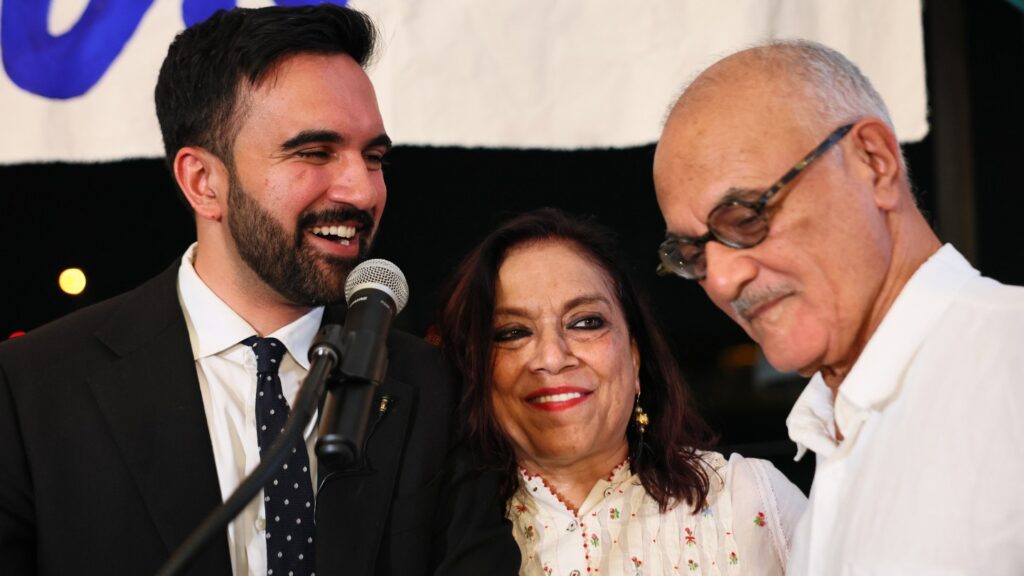
As a young man, Zohran Mamdani often found it difficult to watch his mother, acclaimed filmmaker Mira Nair, leave for extended periods to create her cinematic masterpieces. The bond between the only child and his mother was profound, and he cherished their time together. However, there was one project that Mamdani fully supported her absence for: The Reluctant Fundamentalist, which Nair filmed when Mamdani was a 20-year-old sophomore at Bowdoin College.
“Usually he doesn’t like me being away — he won’t encourage me to go do that romcom,” Nair recalled in a 2013 interview at their Riverside Drive apartment, where she and her husband Mahmood raised their son. “But this one he said, ‘Mamma, you can make.’” Nair described Zohran as “my oxygen, my fuel” in directing the film.
The Impact of The Reluctant Fundamentalist
The Reluctant Fundamentalist holds a special place in Mamdani’s heart, offering insights into the ideological framework that would later shape his political career. The film, based on Mohsin Hamid’s novel, explores the complex emotions and global perspectives following the 9/11 attacks. It tells the story of a Pakistani immigrant, played by Riz Ahmed, who finds success on Wall Street only to become a target of suspicion and arrest after 9/11, despite his innocence.
The narrative delves into the roots of bias and the reasons for fundamentalism, provoking audiences to consider how a radical is made and how mistreatment in the West can contribute to such transformations. A review by The Hollywood Reporter noted that Nair “is extremely careful not to demonize the American or the Pakistani but rather to suggest how much they have in common,” while also confronting the cultural divide exacerbated by 9/11.
“I wanted to understand how there were complicated feelings around 9/11. The shock, the horror, the unbelievable audacity of it. But also that people had reactions that were not always one way or another,” Nair explained.
Zohran Mamdani’s Political Aspirations
Zohran Mamdani is currently vying to become the first Muslim and first South Asian mayor of New York City. His candidacy represents a dream for many in these communities, particularly in the aftermath of 9/11 when Muslims and South Asians were often vilified. Running on a platform to make New York more affordable and livable, Mamdani’s campaign has gained significant traction.
After an innovative campaign, Mamdani, the presumptive Democratic nominee, is set to face off against current Democratic mayor-turned-independent candidate Eric Adams and Republican Curtis Sliwa. The official tally incorporating ranked-choice voting showed Mamdani defeating second-place candidate Andrew Cuomo by a margin of 56%-44%.
Controversies and Challenges
Despite his successes, Mamdani’s campaign has not been without controversy. He has faced criticism over the phrase “globalize the intifada,” which some interpret as a call for violence against Israel. Mamdani has declined to disavow the phrase, stating to NBC News that while “that’s not the language that I use,” he does not believe “that the role of the mayor is to police speech.”
Furthermore, Mamdani has been a vocal critic of Israeli policies and was arrested at a pro-Palestinian rally in Brooklyn shortly after the October 7, 2023, Hamas attacks. He has reassured Jewish New Yorkers concerned about antisemitism, stating, “This is a real crisis that we have to tackle and one that I’m committed to doing.”
The Influence of Family and Heritage
Mira Nair’s influence on Mamdani extends beyond The Reluctant Fundamentalist. Nair’s earlier film, Mississippi Masala, which explores themes of identity and belonging, was also a formative influence. This film, inspired by Nair’s own marriage to Mahmood Mamdani, was a prominent work in their household.
Reflecting on their experiences in New York post-9/11, Nair recounted, “We would all take walks every evening with my father- and mother-in-law, and there was a feeling that we were being looked at askance.” This sentiment was echoed by Mamdani’s friend, comedian Hari Kondabolu, who also felt the impact of 9/11 on South Asian communities in New York.
Republicans have targeted Mamdani, with House Speaker Mike Johnson stating that his primary win proves “THIS is what the Democrats stand for today.” Mamdani’s criticism of Indian Prime Minister Narendra Modi, whom he called a “war criminal” for his role in the 2002 Gujarat riots, further highlights his global perspective.
Looking Forward
Zohran Mamdani’s journey from a young man influenced by his mother’s films to a political candidate reflects a deep commitment to addressing complex cultural and social issues. As he continues his campaign, Mamdani aims to bring marginalized voices into the mainstream, much like the narratives his mother brought to the screen.
His candidacy, shaped by personal and familial experiences, seeks to redefine what it means to be a leader in a city as diverse and dynamic as New York. As Mamdani himself stated, “My hope for this campaign is to bring the margins into the mainstream.”







